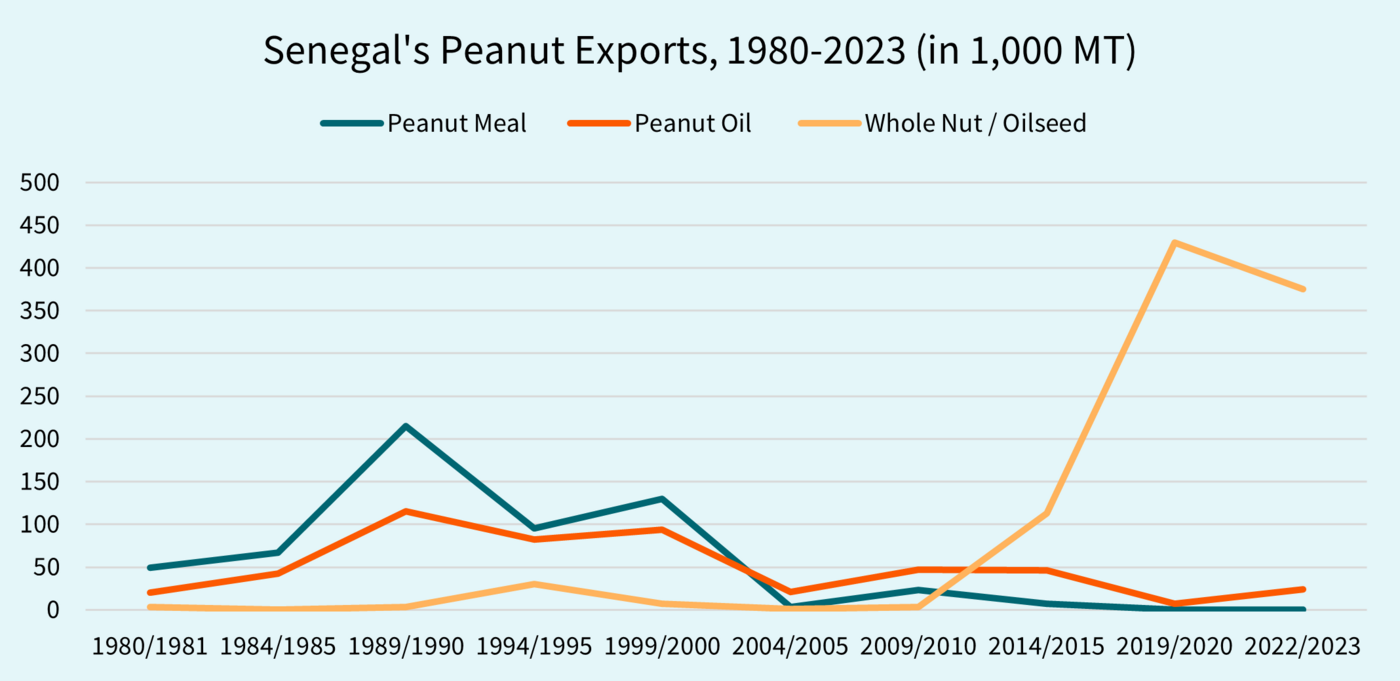Senegal: Booming groundnuts export to China poses long-term risks
Megatrends spotlight 27, 25.07.2023Senegal is one of Africa’s top peanut-exporting countries. Exports to China yield significant benefits for local farmers. But with them come long-term repercussions for local consumption, processing industries, and future production, Daouda Cissé argues in this Megatrends Afrika Spotlight.

In a Chinese factory in Liaoning province, China, peanuts are dried before further processing. Beijing imports large quantities of peanuts from Senegal.
© YAO JIANFENG XINHUAXinhua via AFP
Senegal is among the top exporting countries of peanuts globally. In 2021, Senegal ranked as Africa’s second exporter with an overall export value of USD 285 million, amounting to 6.85 per cent of global peanut exports – a figure that was only topped by Sudan. In 2021, peanuts were the fifth most-exported product in Senegal, amounting to 5.4 per cent of Senegal’s total exports. China alone imported more than 323,000 tons of peanuts from Senegal in 2020, equivalent to more than 90 per cent of Senegal’s total peanut exports. In light of these volumes, it is not surprising that the cultivation and export of peanuts offer considerable economic opportunities for farmers, traders, and the state. Peanuts are considered the backbone of the national economy, with the majority of rural households depending on groundnuts for their livelihoods as well as for subsistence crop production, export, processing, and income generation.
At first sight, large exports to China appear to be a good opportunity for Senegal to improve its account balance and to contribute to domestic growth and employment. However, this strategy comes with several major caveats. Strong external demand for raw nuts and the resulting higher prices penalize local processing industries specifically. As a result, local and international buyers, namely Chinese, compete over the produce – with the Chinese systematically outpricing local buyers.
Processing plants (mainly small and medium-sized firms) are left with limited quantities of peanuts to turn into products such as oil and peanut butter. Production capacities that could contribute to local value-creation remain unused, hindering growth and job-creation, and as such replicating a situation that had led to export restrictions in the past.
In addition to natural limits that cap the overall amount of available peanuts, several challenges add to the unsustainability of current economic practices in the industry: (1) the limited use of modern irrigation technologies, and thus farmers’ over-reliance on rainfalls to ensure food production, (2) the effects of climate change (i.e. with increasing droughts and floods), and (3) the growing scarcity of arable land worsened by rapid urbanization.
Domestic production needs consolidation both for the export of derivative products as well as for consumption. Otherwise, encouraging further exports of raw peanuts risks inducing negative long-term economic consequences in the sector. Reserving and redirecting raw peanuts to domestic processing industries can contribute to the diversification of peanut exports and increase added value in local food production. Senegal needs new policies to mitigate the risks of excessive raw nut exports, which contribute to satisfying global demand, and notably China’s insatiable appetite for the produce.
The Evolution of Peanut Trade in Senegal: A Cyclical Affair
The peanut trade has always been an important economic activity in Senegal. As the main cash crop, peanut cultivation and trade occupy a large number of farmers around the groundnut basin. The crop also contributes considerably to the subsistence of a large share of the Senegalese population, especially in rural areas. Peanuts remain central to the country’s poverty-reduction efforts. More than half of all households in extreme poverty grow the crop. With excessive peanut exports, farmers may find it difficult to keep enough stocks for seed and consumption, thus leading to shortages for local markets and processing industries.
Changing Consumer Preferences
In the past, Lebanese buyers and traders controlled a considerable share of the market. They ran trade counters for peanut collection and acted as intermediaries for peanut importers, mainly colonial industrial companies, which imported peanuts to process them into oil.
Over time, global consumer preferences changed to preferring peanuts for food and not oilseeds. Oil consumption diversified, with customers around the world moving from peanut oil to soy, palm, and sunflower oils. This left a surplus of raw nuts on the Senegalese market, which in turn led the government to lift export restrictions that hitherto used to protect the domestic market. With the shifting global demand, peanut production focussed on whole nuts over processed goods.
Local consumption at the time could still not absorb the significant quantities of the raw product, leading to the amendment of export restrictions of peanuts in 2010. Thereafter, the exporting of peanuts was possible, except for a minimum quantity that was to be retained in the country for seeding (décret n°2010-15 du 13 janvier 2010).

Quelle: United States Department of Agriculture, siehe https://apps.fas.usda.gov/psdonline
© Megatrends Afrika
Domestic Processing vs Exports
Lifting export restrictions led to higher prices for Senegal’s farmers but also led to a decline in the processing industry. The country’s largest processing firm, SUNEOR, declared bankruptcy and was eventually nationalized in 2016 in an attempt to safeguard jobs. It continues its operations as the state-owned Société nationale de commercialisation des oléagineux du Sénégal (SONACOS).
SONACOS provides farmers with seeds, agricultural equipment, and fertilizers at subsidized prices. In return, the public firm purchases part of their peanut production. The company has not been profitable for a long time now and its challenges have increased. For the 2022–2023 season, SONACOS has struggled to collect the quantities it has aimed for.
In fact, the government – offering CFA francs 275 a kilo (USD 0.44) as a minimum price to buy farmers’ output – was outbid by Chinese buyers that offered between CFA francs 350 and 450 a kilo (USD 0.56 –0.73). Such a price gap threatens the peanut supply for the Senegalese market and local industries. This, in turn, is likely to increase unemployment in the sector, mainly affecting the most vulnerable seasonal workers and small-scale traders.
China’s Rising Demand in Nuts and its Variegated Effects
The liberalization of the peanut trade in Senegal in 2010, which effectively ended government-held monopolies on the wholesale market, kick-started a significant increase in the export of whole nuts to China. At the same time, trade barriers and phytosanitary measures imposed by the European Union and the United States hampered Senegalese exports to both regions.
In this context, Chinese demand compensated for the decrease in exports to Europe and the United States. Senegalese farmers were able to maintain or increase their incomes. In 2020, Beijing became Senegal’s top peanut-export destination, with a total value of USD 198 million, meaning that more than 90 per cent of Senegal’s peanut exports go to China.
On the downside, the arrival of Chinese buyers in Senegal has reduced the supply available for local markets and peanut-processing industries, thereby limiting the quantities of peanuts for sale and production, with effects on (soaring) prices for local consumers at times.
Likewise, agro-processing industries face rapidly rising prices, which in turn are likely to reduce local consumption.
Limited Intervention by the Central Government
Although peanut exports to China enable farmers in rural areas in Senegal to increase their incomes, this situation presents challenges for local food processors and consumers. Government intervention is needed to safeguard future production and sustainable socio-economic development.
So far, Chinese buyers have continued to enjoy the Senegalese government’s seal of approval. On the one hand, Beijing’s demand for peanuts constitutes an important source of income. Yet, other dependencies are also likely to influence the government’s course of action. Following the shipments of vaccines in the midst of the global COVID-19 pandemic, export restrictions on peanuts were difficult to justify. That Senegal was one of the first African signatories of the Chinese Belt and Road Initiative can be considered another factor in preventing the government from choosing a more protectionist approach. Lastly, tax revenues ranging between CFA francs 8 and 9 billion (between USD 14 and 16 million) are a non-negligible reason for the government to not restrict the trade in peanuts.
In a limited manner, the government, however, has intervened in an attempt to mitigate some of these negative effects by applying export controls and temporarily suspending the export of peanut seeds. In 2017 the government introduced an exit tax on unprocessed peanut exports. In 2020, it suspended the export of seeds until further notice, lifting the ban only in 2021.
However, given the importance of these exports to the Senegalese economy and the financial benefits for millions of people in rural areas, the temporary suspension of exports does not result in sustainable food security policies that would ensure a sufficient supply for local markets and oil producers in the long term.
Subsidies for seeds, fertilizers, and investments are not enough. The government should also consider measures such as price regulations to avoid speculation, putting limits on quantities sold by farmers for export, and meeting quotas for national consumption.
Yet, regulating or restricting export needs goes hand in hand with offering higher prices to farmers for their crops, ensuring that payments arrive – and doing so in a timely manner. At present, farmers often have to wait several weeks or months before receiving their pay from domestic counterparts; selling to Chinese buyers secures immediate payment. Acting as a credible and attractive buyer will ease tensions between farmers, producers, and processing industries on the one side, and the government on the other.
Even if protectionist measures were installed, Senegal needs more investments in peanut-processing industries to improve productivity and ensure viable jobs in the sector. The World Bank, for instance, suggested a modest export tax on raw nuts that would be earmarked and re-invested in the modernization of domestic supply chains and the processing industry.
The Senegalese government – through its financial institutions (i.e. the agricultural bank) and agricultural agencies (i.e. SONACOS) – needs to assist peanut-processing industries with credits to purchase and collect the stocks they need for their production. It should also deal with fluctuations in the global peanut market. Supporting domestic peanut-processing industries can create added value for (raw) peanut export and export diversification.
Although Senegal is favourably positioned to benefit from the rising global market prices of raw peanuts, measures are needed that will ensure Senegal’s integration into the global market without hampering local production and consumption.